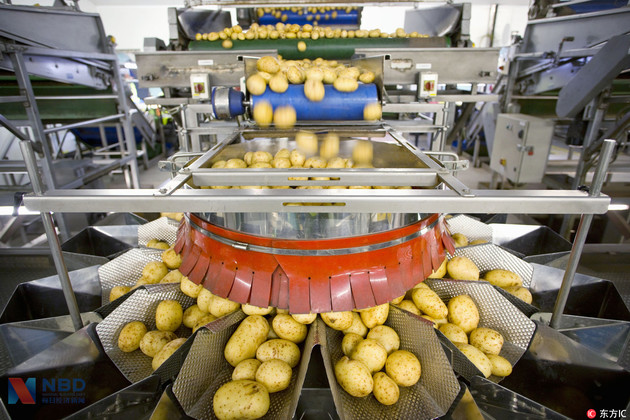
The first phase of Beijing Kaida Hengye Agricultural Technology Development Co Ltd's new and fully automated potato processing plant in Ulanqab, the Inner Mongolia autonomous region, will start full-scale output in March, a company official said.
According to Guo Yonghui, general manager of the company's operations in Inner Mongolia, Kaida has invested 500 million yuan (72 million US dollars) so far in the project.
The first phase of the new plant will have an annual capacity of 100,000 metric tons. Production trials started three months ago. The second and final phase will cost 300 million yuan (43 million US dollars) and will be completed in 2018.
This is the first time such modern technology has been used in Ulanqab city, also known as the "City of Potatoes", Guo said. "We decided to locate the plant in Ulanqab because the place is rich in high-quality potatoes and the local government's policies are supportive."
An original equipment manufacturer or OEM, Kaida makes vegetable-based snacks for other brands.
Given the combination of geographical advantages and upgraded technology, Kaida's profit margin may increase now, Guo said.
Compared to its erstwhile plant in Fangshan district of Beijing, Kaida's new and upgraded factory would save 20 percent to 30 percent on costs like raw materials, logistics and staff, Guo said.
The new plant will cover an area of 194 mu (12.93 hectares) and the annual output value will reach 640 million yuan (92 million US dollars) after completion in 2018.
Yu Guangjun, research fellow at the Inner Mongolia Academy of Social Sciences, said in a previous interview with China Daily: "It's very important to establish a modern agricultural production system, which would surely standardize the operation process and enhance production efficiency."
Statistics from Ulanqab's Agriculture Bureau showed the city increased the planted area for potatoes to 3.9 million mu this year. The output of potatoes is expected to grow 26 percent to 4.45 billion kg this year.
Guo forecast that in the future, the company's order volume from domestic partners would increase faster than that from overseas.


 川公网安备 51019002001991号
川公网安备 51019002001991号





